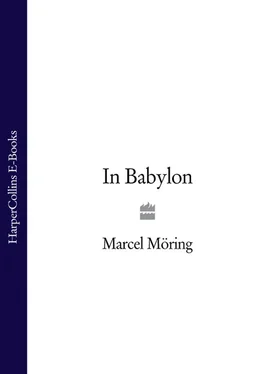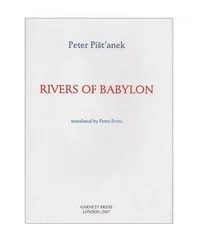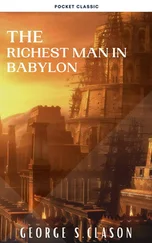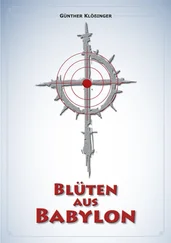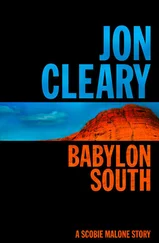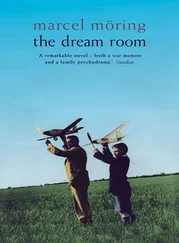The only person in the family who ever opposed my choice of career was Uncle Herman. I can vividly remember the moment when he first heard what I wanted to do with my life. That was in Holland.
I was about fifteen and Herman, who had come to visit, asked my mother, his sister-in-law, whether she had found a school for me yet.
‘He’s been at school since he was six,’ Sophie had answered.
‘University,’ said Uncle Herman. ‘Have you given any thought to what the boy should study?’
Sophie had looked at him in amazement. ‘Herman,’ she said, ‘young people decide for themselves what they should study. Who they marry, too.’
At that last remark, Uncle Herman had gone slightly red in the face. He turned to me and asked what I had in mind. I said that I had nothing in mind.
‘You’re not the only one,’ he said. ‘But the question is: what do you want to be when you grow up?’
‘A fairy tale writer.’
We were sitting in the sun lounge. It was the middle of summer. The doors were open and from the garden came the sound of late birds who were letting other late birds know where they were.
‘Fairy tale writer,’ said Uncle Herman.
‘Fairy tale writer,’ I said.
‘Lord of the Universe,’ said Uncle Herman.
‘I’m good at writing fairy tales,’ I said.
‘Just how do you intend to do this?’
‘What?’
‘Become a fairy tale writer! What are we talking about here?’ The subject made him rather hot under the collar. He slammed his hand down on the armrest of the wicker chair in which he was sitting, his lips pressed firmly together.
I looked at my mother.
‘N,’ said Sophie, glancing worriedly at Uncle Herman, ‘I think what you’re supposed to do now is tell him what you’d like to study.’
‘Oh,’ I said.
Uncle Herman closed his eyes and leaned his head against the back of the chair. He took a deep, slow breath. After a long while he straightened up again and after another long while he opened his eyes and looked at me wearily. ‘All right,’ he said hoarsely. ‘What do you plan to study, Nathan? Are you going to university?’
‘To become a fairy tale writer? I don’t think that exists,’ I said.
‘No, of course it doesn’t exist!’ he shouted.
‘Herman,’ said Sophie. Her mouth had settled into a disapproving frown. ‘If you can’t behave yourself, go back to your big house so you can play lord of the manor.’
Uncle Herman bowed his head and nodded. There was a brief silence, and when he looked at me again it was as if he were seeing me for the first time. I turned around on Sophie’s painting stool and tried to look interested in a charcoal sketch on the easel. ‘Nathan,’ he said finally, ‘you’ve got to do what you’ve got to do, but if you do something, then do it well. What I mean is that you shouldn’t just piddle around and see if it works. Think up your own course of study, your own training, so that you can choose from different skills and won’t be restricted by some accidental talent.’
‘Hold on,’ said Sophie, ‘talent is no small thing, I mean …’
‘Talent, Soph, is the curse of anyone who really wants to do something. Talent is the greatest handicap you can have. Why do you think you’re giving painting lessons to frustrated housewives instead of exhibiting at the Stedelijk? All you’ve got is talent.’
Sophie looked at him with an expression that gave new meaning to the word freeze-dry.
I didn’t understand what Uncle Herman was talking about. I wanted to be a fairy tale writer, because I had discovered that I could do it. What more did he want? That I should first be unable to do it so that I would want it all over again?
As I thought this, I slowly began to realize the significance of Uncle Herman’s words.
That was probably the most important day of my life. Not only did I learn that you had to mistrust talent if you truly wanted to discover anything, I also realized that I had stumbled upon an outlook on life which may or may not have been Uncle Herman’s, but which certainly seemed worth a try.
And so I wrote my fairy tales and the longer I wrote, the deeper Uncle Herman’s strange paradox sank in and the harder it got. By the time I was eighteen I couldn’t do a thing. If I had to make a shopping list – the household chores had been divided up and I was the cook – I spent an hour at the kitchen table mulling over the correct sequence of butter, cheese, and eggs. It was the year when we ate almost nothing but omelettes and pasta with red sauce. I had long since stopped writing fairy tales by then. I cooked, stared at the pans on my stove, the sauce bubbling, the eggs setting, the garlic browning and the blue steam rising from the slow-warming olive oil, while inside me, the words formed mile-long caravans that trekked through the desert of my authorship.
The fact that it turned out all right in the end, I owed to Uncle Chaim. One night I was sitting in my room, reading, when he stepped out of the bookcase and posted himself next to my chair.
‘Kabbala …’ he said after a while, breathless.
‘The Zohar ,’ I said.
‘Forbidden,’ said Uncle Chaim. ‘Not until a man is forty.’
I rubbed my sandy eyes and bowed my head. ‘Nuncle,’ I said. ‘Didn’t you once tell me I was the eldest?’
He tore himself away from the book in my lap and looked at me. ‘A good memory,’ he said, ‘can be a blessing. And a curse.’
I closed my book and let my head sink down onto the back of my chair. ‘I know, Nuncle, I know. But it’s there and there’s nothing I can do about it.’
‘The head,’ he said. ‘Must be covered. With Kabbala, always covered. Always.’
I nodded.
Uncle Chaim waited while I stood up and got my yarmulke from the shelf of Jewish books.
‘Good,’ he said. ‘But now: why?’
‘Why Kabbala?’ I shrugged. ‘Maybe I’m just looking for the path to enlightenment.’ I realized that I sounded somewhat bitter. Uncle Chaim had heard it, too.
‘Write, child. Don’t read. Write.’
There was a stumbling noise behind us. When we looked round, we saw Magnus standing by my bed.
‘You’re still awake,’ he said.
I spread my arms.
He walked towards us. When he was standing next to Uncle Chaim, he cast a quick glance at the book in my lap. He pursed his lips and looked at his uncle.
‘Write,’ said Chaim again. ‘A writer writes, he doesn’t read.’
‘Cooks eat, too,’ I said.
Uncle Chaim shook his head. ‘To keep from starving. To taste. To know. But not to while away an evening.’
‘He can’t write anymore,’ said Magnus. ‘He’s searching for True Writing.’
‘Isn’t any,’ said Uncle Chaim. ‘Just stories.’
Magnus drew himself up. ‘Flaubert said …’
‘Shah! That’s after your time, Magnus. And before his. Nathan only has to worry about himself. He has to do, not think. Listen. Two men are on their way from one town to another. Just happen to meet. One rich. One poor. Time for the evening prayer and one of them recites the Shemona Esrei , from memory. Long. Very long. The other man puts his hand over his eyes. Recites the alphabet. The first man laughs at his companion: “You call that praying, you ignorant fool?” The other man says: “I can’t pray, so I give God the letters and he makes a prayer out of them.” That night the first man falls gravely ill. As if his life is pouring out of him. Cries out to God: “What have I done to deserve this?” He hears a voice that says: “This is because you mocked my servant.” The sick man says: “But he couldn’t even pray!” The voice: “You’re mistaken. He could pray, for he did it with all his heart. You know the phrases and words, but you’re all mouth and no heart.”
Читать дальше
